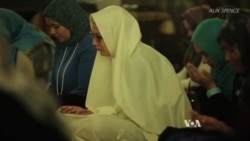Once a month, Muslim women gather in a bright open space inside a brick building near downtown Los Angeles. They come for jumu'ah or Friday prayer.
Muslims all over the world observe jumu'ah, but this gathering is special because the service is run by a woman, for women. Men are not allowed. While women's mosques are common in other parts of the world, there were none among the more than 2,000 mosques in the United States until this one opened at the end of January.
In traditional mosques, Muslim women are separated from male worshippers by a partition and men lead the Friday prayers.
Tanzila Ahmed - a writer, community organizer and policy researchers in her mid-30s - sees this as second-class treatment. She says she always felt like an outsider at traditional mosques when she was growing up: “We were always shuttled into a back room. We weren’t allowed to be in the same space where the sermons were being held."
An Asian American, Ahmed started attending prayer service in this 100-year-old, multi-faith center two months ago when it first opened. She found it empowering to be surrounded by women of all ethnicities and races. She also found it liberating.
"I didn’t have to think about the patriarchy issues that I usually have to deal with when going to a mosque,” she said.
The Women’s Mosque does not have a dress code; it does not require head scarves. And the building, a former synagogue, also houses Jewish and Christian events.
Mosque founder M. Hasna Maznavi says it is why she picked this place for the mosque.
“Something that really inspires me are the golden ages in Islam." she said. "This was a time when Muslims, Jews and Christians all worked together.” Maznavi, whose parents emigrated from Sri Lanka, is a comedy writer by profession.
Empowering Muslim Women
Director of Policy and Programming at the Muslim Public Affairs Council Edina Lekovic gave the sermon on the opening day of the mosque. Lekovic, who is Montenegrin American, often serves as a national spokesperson for the Muslim community. She says the mosque is about empowering women to serve in the greater Muslim community.
“When I stepped up to the plate I felt that I was connected to the women in the audience and realizing that we were all there for the same reason because we wanted to reconnect to our faith or take the next step in our faith and that we wanted to try something a little different,” Lekovic said.
But not everyone believes an all-women’s mosque is necessary. Islamic scholars say while it is acceptable for women to lead other women in prayer, they question whether that should include the mid-day Friday prayer or the sermon.
The discussion about women’s role in Islam is not a new one says Brie Loskota at the University of Southern California.
“The Women’s Mosque itself is not an isolated event. There have been a lot of critiques of women’s roles and the limited and narrow nature of many of those roles in Muslim institutions for many decades," she said. "And that has come to a head especially with the Gen X, millennial Muslim women.”
Loskota says the Women’s Mosque is an outgrowth of these critiques and that it bears the hallmarks of the millennial Muslim women who founded it.
“There’s a large focus on inter-religious dialogue," she said. "There’s a a great focus on pluralism and how you exist in a plural context. There’s a great focus on diversity.”





